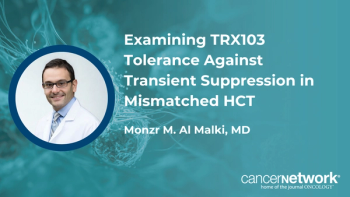
First-Line Tislelizumab/Chemotherapy Improved OS in PD-L1–Expressing Locally Advanced Unresectable/Metastatic Gastric or GEJ Cancer
Tislelizumab met the primary end point of overall survival in the phase 3 RATIONALE 305 trial in a population of patients with locally advanced unresectable/metastatic gastric or gastroesophageal junction cancer with a PD-L1–expressing tumor in the first-line setting.
A first-line combination of tislelizumab (BGB-A317) and chemotherapy improved overall survival (OS) in a group of patients with PD-L1–expressing locally advanced unresectable/metastatic gastric or gastroesophageal junction cancer (GEJ), according to a press release on findings from the phase 3 RATIONALE 305 trial (NCT03777657).1
The tislelizumab combination, which was assessed vs placebo and chemotherapy, met the study’s primary end point of OS at the interim analysis. Investigators noted that further follow-up will be required to assess OS benefit in the intent-to-treat group. Notably, safety findings for tislelizumab were consistent with prior results, and the addition of chemotherapy did not yield any new safety findings.
“The addition of tislelizumab to chemotherapy significantly extended the [OS] for previously untreated patients with advanced or metastatic gastric or [GEJ] adenocarcinoma whose tumor expressed PD-L1. We will continue to follow up to determine OS benefits across the patient population in the trial,” Yong (Ben) Ben, MD, chief medical officer, Solid Tumors at BeiGene, said in a press release.
The global, double blind, placebo-controlled trial assessed the humanized monoclonal antibody tislelizumab in combination with platinum- and fludarabine-based chemotherapy vs the same chemotherapy backbone and placebo.2 Investigators planned to enroll approximately 720 patients randomized 1:1 to receive either 200 mg of intravenous tislelizumab every 3 weeks plus 130 mg/m2 of oxaliplatin every 3 weeks; 1000 mg/m2 of oral capecitabine twice a day for 2 weeks or 80 mg/m2 of cisplatin intravenously every 3 weeks; and 800 mg of 5-fluorouracil on days 1 to 5 every 3 weeks, or the placebo regimen.
To be eligible for the study, patients were required to have histologically confirmed disease and an ECOG performance status of 0 or 1. Moreover, adequate organ function and 1 or more measurable lesions were necessary for enrollment.
The study had several secondary end points, including safety, overall response rate, duration of response, and quality of life. Additionally, exploratory end points included disease control rate, clinical benefit rate, time to response, and a predictive biomarker analysis that includes PD-L1 expression.
References
- BeiGene announces positive findings from phase 3 trial of tislelizumab in combination with chemotherapy in first-line gastric or gastroesophageal junction cancer. News release. BeiGene. January 24, 2022. Accessed January 25, 2022. https://bwnews.pr/3IC5SsZ
- Xu R, Arkenau T, Bang Y, et al. P-26 RATIONALE 305: Tislelizumab plus chemotherapy versus placebo plus chemotherapy as first-line therapy in patients with gastric or gastroesophageal junction adenocarcinoma. Ann Oncol. 2020;31(suppl 3):S97-S98. doi:10.1016/j.annonc.2020.04.108
Newsletter
Stay up to date on recent advances in the multidisciplinary approach to cancer.










































